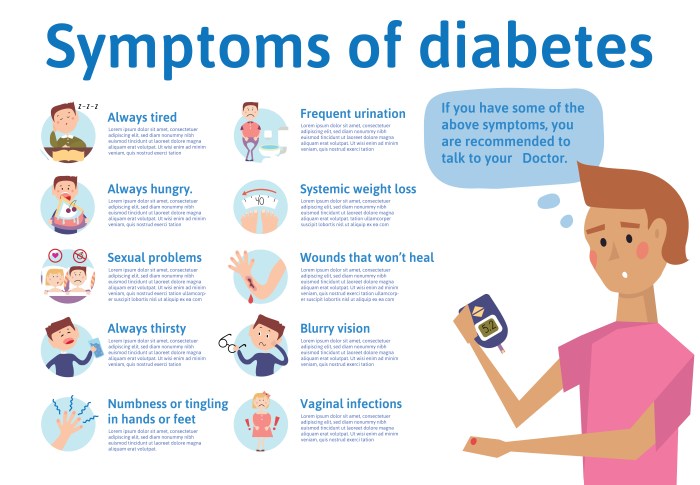Common symptoms of diabetes are crucial to identify for early intervention. From excessive thirst to unexplained weight loss, this topic delves into the various signs to watch out for. Get ready to explore the physical, emotional, and long-term symptoms associated with diabetes in this comprehensive guide.
Common Symptoms of Diabetes
Diabetes is a chronic condition that affects how your body uses sugar (glucose) from the food you eat. Here are some common symptoms to watch out for:
Excessive Thirst
One of the typical signs of diabetes is feeling constantly thirsty, even after drinking plenty of fluids. This is because high blood sugar levels can cause dehydration, leading to increased thirst.
Unexplained Weight Loss, Common symptoms of diabetes
Another symptom of diabetes is unexplained weight loss, despite eating more than usual. When your body doesn’t have enough insulin to process glucose for energy, it starts burning fat and muscle for fuel, resulting in weight loss.
Frequent Urination
People with diabetes often experience a frequent need to urinate, especially at night. This is due to the kidneys working overtime to filter and absorb excess sugar in the blood, leading to increased urine production.
Physical Symptoms: Common Symptoms Of Diabetes
Fatigue is a common physical symptom experienced by individuals with diabetes. This persistent feeling of tiredness can impact one’s daily activities and overall quality of life.
Fatigue
Fatigue in diabetes is often attributed to the body’s inability to effectively utilize glucose for energy due to insulin resistance or insufficient insulin production. This can lead to a lack of energy, weakness, and a constant feeling of tiredness.Blurred vision is another physical symptom that can affect individuals with diabetes. Fluctuations in blood sugar levels can cause the lens of the eye to swell, leading to changes in vision.
Blurred Vision
Individuals with diabetes may experience blurred vision that comes and goes throughout the day. This can make it challenging to focus on tasks such as reading, driving, or using electronic devices. It is essential to monitor blood sugar levels regularly and seek medical attention if vision problems persist.Slow-healing wounds are a concerning physical symptom that individuals with diabetes may encounter.
High blood sugar levels can impair the body’s ability to heal wounds, making cuts, sores, or infections take longer to recover.
Slow-healing Wounds
Examples of slow-healing wounds in diabetes include diabetic foot ulcers, cuts, or bruises that do not heal as quickly as they should. Proper wound care, blood sugar management, and regular medical check-ups are crucial in preventing complications related to slow wound healing.
Emotional Symptoms

Living with diabetes can take a toll not only on the body but also on mental health. The emotional symptoms associated with diabetes can impact a person’s overall well-being and quality of life.
Irritability and Diabetes
Irritability is a common emotional symptom experienced by individuals with diabetes. Fluctuations in blood sugar levels can lead to mood swings, including feelings of irritability and frustration. When blood sugar levels are not well managed, it can be challenging to regulate emotions, leading to irritability.
Anxiety and Diabetes Management
Managing diabetes can be overwhelming and stressful, which may result in feelings of anxiety. The constant need to monitor blood sugar levels, adhere to a strict diet, and take medications can create anxiety about the future and the impact of diabetes on one’s health. The fear of complications and the pressure to maintain control over the condition can contribute to anxiety symptoms in individuals with diabetes.
Long-Term Symptoms
Diabetes is a chronic condition that can lead to various long-term complications if not properly managed. These complications can affect different parts of the body and have serious consequences if left untreated.
Nerve Damage
Nerve damage, also known as diabetic neuropathy, is a common long-term complication of diabetes. High levels of glucose in the blood can damage the nerves throughout the body, leading to symptoms such as numbness, tingling, and pain, usually starting in the feet and hands. This condition can also affect digestion, sexual function, and cardiovascular health.
Increased Risk of Heart Disease
Individuals with diabetes have a significantly higher risk of developing heart disease compared to those without the condition. The high levels of glucose in the blood can damage the blood vessels and the heart itself over time, increasing the risk of heart attacks, strokes, and other cardiovascular problems. It is crucial for individuals with diabetes to manage their blood sugar levels and other risk factors to reduce the likelihood of heart complications.
Impact on Kidney Function
Diabetes is one of the leading causes of kidney disease, known as diabetic nephropathy. High blood sugar levels can damage the small blood vessels in the kidneys, affecting their ability to filter waste from the blood effectively. Over time, this can lead to kidney failure, requiring dialysis or even a kidney transplant. It is essential for individuals with diabetes to undergo regular screenings and manage their condition to protect their kidney function.
